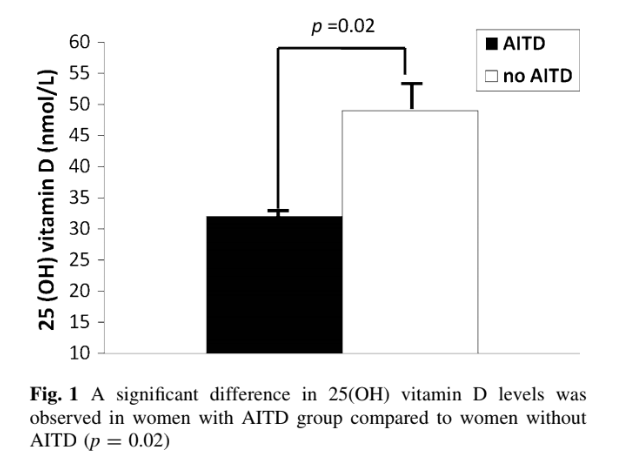Vitamin D is crucial for metabolism, insulin sensitivity, and hormonal health, and chances are you’re not getting enough of it.
Here in Canada especially, it’s nearly impossible to have sufficient vitamin D in wintertime. Tests from patients at our Toronto clinic show very low levels of this vitamin, and most of them take less than 2000 UI daily.
A recent study [2] found that women with PCOS who are deficient in vitamin D tend to do better when they taken higher doses of this key vitamin. Those who were deficient had improved glucose and lipid metabolism markers when taking 4,000 UI daily, when compared to those who took 1000 UI.
Another 2015 study [3] also found an interesting correlation between PCOS and Vitamin D. It followed fifty women with PCOS and measured their levels of vitamin D, TSH, Anti TG, free T3, and free T4 (the latter of these are markers of thyroid function). Firstly, they found that the women who had Hashimoto’s Thyroiditis (an autoimmune thyroid disease) had significantly lower vitamin D levels than the others.
The prevalence ofHashimoto’s in women with PCOS in this particular study was 24 percent. This concurred with a previous study performed by Jannsen et al. [6] that reported that 25 percent of women with PCOS also had Hashimoto’s Thyroiditis.
Related:Natural Treatments for Hashimoto’s Thyroiditis: A Different View on a Common Disease
Vitamin D is Vital for Autoimmune Disorders
Recently,vitamin D deficiency has been repeatedly identified as an environmental trigger of Hashimoto’s Thyroiditis. Studies have determined that patients with Hashimoto’s Thyroiditis have lower 25(OH) vitamin D levels compared to healthy subjects [7].This finding was subsequently confirmed by Tamer et al. [8], who demonstrated an increased prevalence of vitamin D deficiency in patients with the disease.
Since vitamin D is so important to many of our physiology systems, deficiency can cause many different health issues, and this is especially true in women with PCOS. In PCOS, we know that deficiency of this vitamin contributes to the risk of developing metabolic issues like insulin resistance. [4, 5].
Vitamin D insufficiency has been defined as a serum 25(OH)D level of 21-29 ng/mL (52-72 nmol/L). Below this cut-off point, there’s a risk of negative effects on metabolic hormones, calcium absorption, and parathyroid hormones. It is also well-known that this vitamin regulates the immune system, and both autoimmune disorders and inflammation can be aggravated when it is lacking.
For most people, it’s nearly impossible to get sufficient amounts of this vitamin without supplements. As mentioned, this is especially true in wintertime, particularly in places like Canada and the Scandinavian countries. Make sure you stay on top of your supplement intake during this time of year, and get out into the sunshine when you can!
Article References:
- Giovanna Muscogiuri1 • Stefano Palomba2 • Mario Caggiano3 • Domenico Tafuri4 •Annamaria Colao1 • Francesco Orio4,5Low 25 (OH) vitamin D levels are associated with autoimmune thyroid disease in polycystic ovary syndromeunknownunknown;unknown(unknown):unknown.unknown
- Foroozanfard et al.Effect of Two Different Doses of Vitamin D Supplementation on Metabolic Profiles of Insulin-Resistant Patients with Polycystic Ovary Syndrome: A Randomized, Double-Blind, Placebo-Controlled TrialHormone and Metabolic Research49(8);612-617(unknown):unknown.unknown
- Muscogiuri, G., Palomba, S., Caggiano, M. et al.Endocrine (2016) 53: 538.unknownunknown;unknown(unknown):unknown.unknown
- G. Muscogiuri, J. Mitri, C. Mathieu, K. Badenhoop, G. Tamer, F. Orio, T. Mezza, R. Vieth, A. Colao, A. PittasMechanisms in endocrinology: vitamin D as a potential contributor in endocrinehealth and diseaseEur. J. Endocrinol.171(3);R101-R110 (2014)(unknown):unknown.unknown
- G. Muscogiuri, C. Policola, A. Prioletta, G. Sorice, T. Mezza, A. Lassandro, S. Della Casa, A. Pontecorvi, A. GiaccariLow levels of 25(OH)D and insulin-resistance: 2 unrelated features or acause-effect in PCOS?Clin Nutr31(4);476-480 (2012)(unknown):unknown.unknown
- O.E. Janssen, N. Mehlmauer, S. Hahn, A.H. Offner, R. GartnerHigh prevalence of autoimmune thyroiditis in patients with polycystic ovary syndromeEur. J. Endocrinol.150(3);363-369 (2004)(unknown):unknown.unknown
- H. Orbach, G. Zandman-Goddard, H. Amital, V. Barak, Z. Szekanecz, G. Szucs, K. Danko, E. Nagy, T. Csepany, J.F. Carvalho, A. Doria, Y. ShoenfeldNovel biomarkers in autoimmune diseases: prolactin, ferritin, vitamin D, and TPA levels in autoimmune diseasesAnn. N. Y. Acad. Sci.1109;385-400 (2007)(unknown):unknown.unknown
- G. Tamer, S. Arik, I. Tamer, D. CoksertRelative vitamin D insufficiency in Hashimoto’s thyroiditisThyroid21;891-896 (2011)(unknown):unknown.unknown

